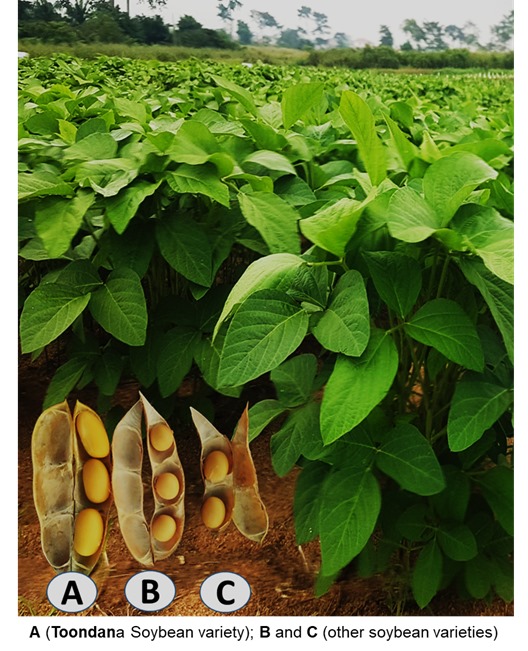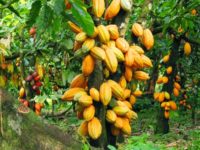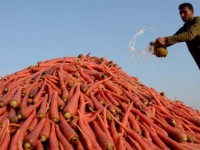Soybean Variety ‘Toondana’ set to help drive soybean cultivation in Ghana.

Soybean is the third most important grain legume produced in Ghana after groundnut and cowpea. Soybean is cultivated across the country especially in the guinea savannah and the Forest-Savannah Transition zones. However, it is also cultivated in parts of southern Ghana.
Toondana is an improved soybean variety developed in Ghana by the Crops Research Institute (CRI) of the Council for Scientific and Industrial Research (CSIR). It possesses a good package of attributes that can help scale-up soybean production in Ghana to satisfy both local and international soybean market demand. Other equally good improved soybean varieties released by the Institute include ‘Nangbarri’, ‘Anigyee’ and ’Gyidee’.
The CSIR-Crops Research Institute (CSIR-CRI) is the leading agricultural research organization in Ghana and a Centre of excellence for agricultural research, innovation and capacity building for development. It is a non-profit Government research organization with a mission to develop and disseminate demand-driven technologies and build capacity for sustainable food and industrial crop production.
Ghana urgently requires a continuous strategic investment into soybean research and development to enable it harness the power of technology, science and innovation to maximize production and resilience in the soybean value chain. To this end, the CSIR-CRI released the Toondana soybean variety to help boost and strengthen Ghana’s growing soybean industry.
Toondana soybean variety can add a great deal of resource support to the already known varieties for the recently launched second phase of government’s flagship programme for Plant for Food and Jobs. The Planting for Food and Jobs programme; phase two is designed to address challenges in Ghana’s agricultural sector, accelerate growth in the agricultural sector and to encourage and provide jobs for the teeming youth in Ghana.
Toondana is a non-genetically modified variety much like any other variety developed so far in Ghana. Many small-holder and commercial soybean farmers across the country are gaining a lot of confidence in the cultivation of Toondana. It has a high potential yield of up to 3.5 t/ha. The high number of pods distributed over their many-branches and its seed size contribute immensely towards its high grain yield. Toondana, arguably has the highest grain size among all soybean varieties currently cultivated in Ghana. Its impressive yield is achieved only within 95 to 100 days, ie. 15 to 20 days before other varieties would be ready for harvesting. Furthermore, Toondana possesses an erect plant structure with an appreciable level of resistance to lodging. It has a good pod clearance and a high resistance to pod shattering. These traits, altogether, make Toondana the preferred soybean variety, among the host of soybean varieties in Ghana, for mechanized harvesting. It has an appreciable resistance against economic insect-pests and major soybean diseases such as rust. Toondana grows very well across all major agro-ecologies in Ghana eg. Guinea and coastal savannah, forest transition and the forest regions.
Several farmers in Ghana are adopting the production of soybean as a viable agricultural business. The market for soybean in Ghana is growing fast due to a high demand for animal (poultry, aquaculture and livestock) feed, cooking oil, industry raw material, exports and associated socio-economic benefits. These factors are assisting in the establishment of a vibrant soybean value chain in Ghana. According to the Ministry of Food and Agriculture, although Ghana’s soybean production potential stands at about 700,000 tonnes per year, only about 26 percent of this potential has been achieved in recent years. This led to a substantial shortfall in the country’s ability to meet local demand for the local industry although the country also imported soybeans from other soybean production countries. This supply deficit was further deepened by the restrictions and disruptions to the importation of soybean products due to COVID-19 and the war in Ukraine.
It is however important to note that the export of Ghana’s soybean has also contributed to the crop’s supply-demand challenges. Ghana’s annual soybean export increased from $12.7 million in 2020 to $18.6 million in 2021 (GEPA, 2021). This increase in the crop’s export margin has been partly attributed to the high interest by the international market such as Asia, for soybean from Ghana basically because our soybeans are Non-GMO, that is, not genetically modified.
The total consumption of soybean in 2022 was 253,175.00MT and is expected to increase to 1,043,721.49MT by 2027 (over 412%) due to increasing demand for animal feed and exports.
Research into the improvement of soybean is one of the key areas of concern and interest to the Crops Research Institute. Soybean research and improvement at the Crops Research Institute is being run by a team of scientists led by Dr. Sylvester Addy (a legume breeder) and supported by Prof. James Asibuo (a legume breeder), Dr. Kennedy Agyeman (an agronomist), Mr. Paul Marno (a breeder) and Dr. Keteku Agbesi (an agronomist) and others.
The CSIR-CRI is currently welcoming and inviting collaborations with both local and foreign developmental partners to further improve the soybean value chain and also to conduct further research to churn out a stream of further and better soybean varieties and technologies tailored toward meeting the various needs of the crop’s value chain actors in a sustained manner. CSIR-CRI is committed to partner with NGOs, farms, farmers, processors and seed companies across the country to achieve this objective.
For enquiries, please contact the office of the CSIR-Crops Research Institute on 233 (0) 322062522 and cridirector@yahoo.com.
Authors: Dr. Sylvester Addy and Dr. Kennedy Agyeman
Contact: 233 (0)249658813; vestera2000@yahoo.com





